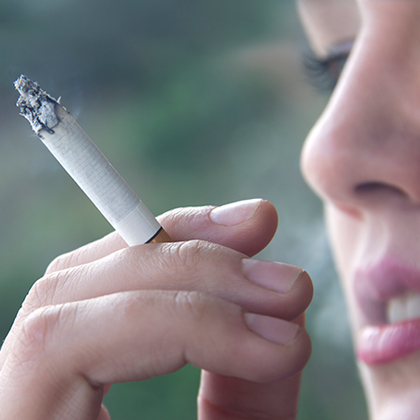If you’re a smoker, you may already know about some of the statistics about your habit. However, most startling must be the fact that 78,000 people in the UK currently die from smoking every year, with many others living with serious smoking-related illnesses (i).
Yet according to Action on Smoking and Health (ASH), the most recent figures suggest there are still around 7.2 million adults in this country who smoke – 16.5 per cent of men and 13 per cent of women (the equivalent of 14.7 per cent of the total UK population) (ii).
Most people – smokers and non-smokers – may realise that smoking causes lung cancer. But experts believe it also plays a part in the development numerous other cancers, including lip, mouth, throat, bladder, kidney, stomach, liver and cervical cancer, not to mention respiratory disease and heart disease. In fact, it’s the leading cause of preventable death and disease in the UK, killing around seven million people a year worldwide (iii).
Other health problems
But that’s not all. Smoking has also been linked to many other health problems, including:
-
Eye diseases (including cataracts and age-related macular degeneration)
-
Miscarriage
-
Premature and still birth
-
Peptic ulcer
-
Premature skin ageing
Experts from the Alzheimer’s Society also claim there’s strong evidence that smoking increases the risk of developing dementia (iv).
The reason smoking is so bad for your health is that tobacco smoke contains a cocktail of harmful substances such as tar, carbon monoxide, arsenic, formaldehyde, lead, mercury, ammonia, acetone, benzene , toluene, acrolein and cyanide. But perhaps the most famous substance in cigarette smoke is nicotine – a substance that’s believed to be more addictive than illegal drugs such as heroin and cocaine (v). So it’s no wonder many smokers have a hard time giving up.
Smoking ban
The good news is that things are improving. In 1974, 51 per cent of men and 41 per cent of women smoked (ii) – which means that smoking rates today have plummeted since then. The ban on smoking in enclosed public spaces – which has been in force throughout the UK since 2007 – has also had a positive effect on the nation’s health.
While controversial initially, the ban has been successful in helping more smokers to give up (during the first three months after the ban, the number of cigarettes sold in England alone dropped by 6.3 per cent, with experts estimating around 1,200 heart attacks were prevented in that first year alone (vi)).
Benefits of giving up
When you give up smoking, some of the health benefits are almost.
-
Within 20 minutes, your pulse and blood pressure return to normal.
-
After eight hours the nicotine and carbon monoxide levels in your blood start to become lower and your oxygen levels increase.
-
After 24 hours your risk of having a heart attack begins to fall.
-
After 48 hours all traces of nicotine are removed from your body and your senses of taste and smell improve.
-
After 72 hours your breathing becomes easier as your bronchial tubes begin to relax.
Then over the next few weeks your circulation improves, which gives you more energy and makes physical activity easier. A month after giving up your skin will look fresher and less wrinkled, and three to nine months later you’ll be coughing and wheezing less.
After five years of giving up smoking, your risk of developing coronary heart disease reduces to around half that of a non-smoker. Ten years later your lung cancer risk is reduced to about half that of someone who still smokes and 15 years later your heart attack risk becomes the same as someone who’s never smoked.
But there are lots of other benefits too, including the following:
Better teeth and gums
According to the Oral Health Foundation, smoking can lead to tooth staining, gum disease, tooth loss and in more severe cases, mouth cancer (vii).
Better hair
Smokers are thought to be more likely to go grey early compared with non-smokers, while some experts believe there’s a link between smoking and male hair loss too.
Better love life
Various surveys suggest many single people wouldn’t consider going out with a smoker, with one poll finding 70 per cent of women are put off by those who smoke (though fewer men – 46 per cent – said they would avoid dating a smoker) (viii).
Better fertility
Smoking is thought to affect ovulation and make it more difficult for women to conceive, while in men it may affect sperm quality too. There’s also some evidence that smokers are more likely to go through menopause earlier than non-smokers (ix), which means some women who smoke may have fewer fertile years.
Safer home
Smoking is known to be one of the biggest causes of house fires, with a third of people who die in house fires in this country killed by a blaze started by cigarettes.
Tips for giving up smoking
The nicotine in tobacco products is highly addictive, which is why so many smokers find it difficult to quit. But there are lots of things you can do to give yourself the best chance of kicking the habit. Here are some tips that may help:
Plan ahead
When you first decide you’re going to quit, choose a good day to start. For instance, try not to pick a time when you're going to be under lots of stress or when you have lots of social events organised. Also don’t keep the fact that you’re trying to give up smoking a secret. In fact it’s a good idea to tell all your friends and family. That way, any who are still smoking may be less likely to smoke in front of you or accidentally offer you a cigarette. You may also be surprised how much help and support those around you may offer, especially if they went through the process of giving up smoking too.
Have a clear out
When you start to quit, throw out all your old ashtrays, lighters and half-smoked boxes of cigarettes – or anything that may remind you of smoking. In the beginning it may also be a good idea to avoid people and places you think may make you want to smoke. Think about the type of situations and places that may tempt you, and stay away from them until you’re feeling strong. This may involve changing your social routine and avoiding drinking alcohol for a while.
Try something new
People who are trying to give up often claim they don’t know what to do with their hands. So think about things that may distract you – a new hobby, for example. Some quitters may also gain weight because they snack on unhealthy foods when they feel the urge to put something in their mouth. So instead, stock up your fridge with healthy snacks – carrot sticks, for example, are much better to nibble on than chocolate biscuits.
Save up
Having more money in your pocket is a great incentive to stick at giving up. So try putting the money you would be spending on cigarettes into a money box or a jar, then buy yourself something you wouldn’t normally be able to afford at the end of each week or month.
Stay active
Taking regular exercise may help boost your mood and help you get a good night’s sleep so that you don’t give in to temptation because you’re tired. And if you find your appetite increases when you quit, being more active can help keep your weight down too.
Wait for five
Most quitters say the hardest part of giving up smoking is the cravings they get for nicotine. But if you wait for just five minutes whenever you get a strong urge to smoke, the craving should disappear. While you’re waiting, do something that keeps you busy and takes your mind off smoking.
Make a list
Finally, it’s a good idea to write down all the reasons why you’re giving up smoking. Then whenever you feel temptation may get the better of you, read it back to remind yourself and reinforce your intentions. Most importantly, don’t give in to the idea that just one cigarette won’t do you any harm. In fact, just one cigarette could put you right back to where you were before you started to quit.
Support for nicotine cravings
According to ASH, almost six out of every 10 smokers say they want to quit (xi). But many of those who keep smoking do so because they’re addicted to nicotine.
The good news is that there’s more support than ever to help you quit smoking successfully these days. If you find it difficult to cope with nicotine cravings there are several types of products available that can help, including patches, gum, lozenges, nasal sprays and inhalators. Called nicotine therapy replacement (NRT) products, these work by gradually releasing nicotine into your bloodstream – but at much lower levels than you get from smoking. – and are usually used for eight to 12 weeks.
ASH claims there’s evidence that using stop smoking products along with behavioural support can make you three times as likely to quit successfully (xi). So here's a quick rundown on the NRT products that could help you quit for good:
-
Nicotine patches
Worn on your skin, patches deliver a steady dose of nicotine over 24 or 16 hours. -
Nicotine gum
Gum allows nicotine to be absorbed through the lining of your mouth. -
Lozenges
These deliver nicotine that dissolves slowly (up to 30 minutes) in your mouth. -
Microtabs
These are small tablets containing nicotine that dissolve under your tongue. -
Nasal spray
These sprays deliver a fast effective dose of nicotine that's absorbed through the lining of your nose. -
Inhalators
These are plastic tubes that look like cigarettes. They release nicotine vapour into your mouth and throat. Many of these products are available at pharmacies, though you may also be able to get them on prescription from your GP. Other medicines that aim to help smokers quit smoking include varenicline (known as Champix) and bupropion (Zyban), which come as a course of tablets.
Varenicline works by preventing nicotine from reaching the nicotine receptors in the brain and by stimulating dopamine production, which make smoking less satisfying. Bupropion, on the other hand, works by reducing or entirely alleviating cravings and nicotine withdrawal by blocking the pleasure smokers feel when they smoke.
Stop smoking services
The NHS also offers free stop smoking services where advisers recommend aids such as NRT products and stop smoking medication. Most of these services offer support via one-to-one appointments with an adviser, but in some areas you could also join a group or make use of drop-in services. According to the NHS, people who use these stop smoking services are four times more likely to stop smoking for good than those who don’t (xii). To find your local stop smoking adviser, ask your GP. Alternatively, you can call one of the following free helplines, depending on where you live:
-
In England, call the Smokefree National Helpline on 0300 123 1044
-
In Wales, call Stop Smoking Wales Helpline on 0800 085 2219
-
In Scotland, call Smokeline on 0800 84 84 84
-
In Northern Ireland, visit stopsmokingni.info/ways-quit/local-help-and-support
Alternatively, for more information, visit nhs.uk/better-health/quit-smoking.
Natural support for smokers
While natural supplements may not help you to quit smoking directly, if you’re a smoker your level of certain nutrients may be depleted. Taking these nutrients may help to support your body while you quit by giving it what it needs. Other supplements may help by relieving stress associated with stopping smoking.
Vitamin E
This antioxidant vitamin is found in every cell of the body, and is widely thought to be important for cardiovascular health. Smoking is thought to increase the oxidative stress on the body, which suggests a greater need for antioxidant intake (including that from vitamin E). One study claims taking a vitamin E supplement may partially reduce the oxidant stress caused by smoking (xiii). There’s also evidence that smoking depletes vitamin E (xiv).
Vitamin C
It’s also widely acknowledged that smoking depletes levels of vitamin C in the body. So as with vitamin E, the more you smoke, the more you need the antioxidant effect of vitamin C. This explains why many nutritional practitioners recommend taking vitamin C supplements if you’re a smoker. There is, however, an added advantage of taking vitamin C if you smoke. Researchers from Oregon State University believe taking vitamin C supplements may also prevent the vitamin E deficiency that affects smokers (xv).
Vitamin B
In addition to vitamins E and C, smoking is also thought to deplete the body’s level of several vitamin B vitamins, including folic acid, vitamin B6 and vitamin B12 (xvi). To prevent deficiency, it may be useful to take a good-quality B complex supplement.
L-Theanine
Giving up smoking is well known for causing stress, thanks to the nicotine withdrawal symptoms you experience. One natural supplement that may help keep you feeling calm is an amino acid found mainly in tea, called theanine. Indeed, studies suggest taking theanine may help to reduce stress without causing drowsiness (xvii).
Giving up smoking is one of the hardest things to do, but it’s also one of the best things you can do to improve your overall health. For more information on other common health problems and tips on how to manage them, visit our health library.
References:
-
Available online: https://www.nhs.uk/common-health-questions/lifestyle/what-are-the-health-risks-of-smoking
-
Available online: https://ash.org.uk/wp-content/uploads/2019/10/SmokingStatistics.pdf
-
Available online: https://patient.info/healthy-living/quit-smoking-cessation
-
Available online: https://www.alzheimers.org.uk/about-dementia/risk-factors-and-prevention/smoking-and-dementia
-
Available online: https://www.ashscotland.org.uk/media/5861/4addiction.pdf
-
Available online: https://www.bhf.org.uk/informationsupport/heart-matters-magazine/news/smoking-ban
-
Available online: https://www.dentalhealth.org/smoking-and-oral-health
-
Available online: https://www.independent.co.uk/life-style/love-sex/smoking-women-partner-unattractive-dating-vaping-survey-inogen-a8357356.html
-
Whitcomb BW. et al., Cigarette Smoking and Risk of Early Natural Menopause. American Journal of Epidemiology. 2018 Apr;187(4):696-704. Available online: https://academic.oup.com/aje/article/187/4/696/4080179
-
Available online: https://www.gov.uk/government/news/smoking-time-bomb-cigarettes-the-most-deadly-cause-of-house-fire-fatalities
-
Available online: https://ash.org.uk/wp-content/uploads/2020/03/2020StoppingSmoking.pdf
-
Available online: https://www.nhs.uk/live-well/quit-smoking/nhs-stop-smoking-services-help-you-quit
-
Duthie. GG, Arthur. JR, James. WP. Effects of smoking and vitamin E on blood antioxidant status. Am J Clin Nutr. 1991 Apr;53(4 Suppl):1061S-1063S. Available online: https://academic.oup.com/ajcn/article-abstract/53/4/1061S/4715099
-
Bruno. RS, Traber. MG. Cigarette smoke alters human vitamin E requirements. J Nutr. 2005 Apr;135(4):671-4. Available online: https://www.ncbi.nlm.nih.gov/pubmed/18441173
-
Bruno. RS, Leonard. SW, et al. Faster plasma vitamin E disappearance in smokers is normalized by vitamin C supplementation. Free Radic Biol Med. 2006 Feb15;40(4):689-97. Available online: https://www.sciencedirect.com/science/article/abs/pii/S0891584905006611
-
Gabriel. HE, Crott. JW, et al. Chronic cigarette smoking is associated with diminished folate status, altered folate form distribution, and increased genetic damage in the buccal mucosa of healthy adults. Am J Cl Nutr. April 2006. Vol 83 no 4 835-841. Available online: https://academic.oup.com/ajcn/article/83/4/835/4649177
-
Kimura. K, Ozeki. M, Juneja. LR, Ohira. H. L-Theanine reduces psychological and physiological stress responses. Biol Psychol. 20072007;74(1):39-45. Available online: https://www.sciencedirect.com/science/article/abs/pii/S0301051106001451
Related Posts
Disclaimer: The information presented by Nature's Best is for informational purposes only. It is based on scientific studies (human, animal, or in vitro), clinical experience, or traditional usage as cited in each article. The results reported may not necessarily occur in all individuals. Self-treatment is not recommended for life-threatening conditions that require medical treatment under a doctor's care. For many of the conditions discussed, treatment with prescription or over the counter medication is also available. Consult your doctor, practitioner, and/or pharmacist for any health problem and before using any supplements or before making any changes in prescribed medications.

Christine
Christine Morgan has been a freelance health and wellbeing journalist for almost 20 years, having written for numerous publications including the Daily Mirror, S Magazine, Top Sante, Healthy, Woman & Home, Zest, Allergy, Healthy Times and Pregnancy & Birth; she has also edited several titles such as Women’ Health, Shine’s Real Health & Beauty and All About Health.
View More



